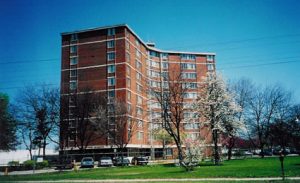Landlord Guidelines
Housing Choice Voucher (HCV) Programs
Section 8
Landlord Guidelines
Tenant Selection
The Saginaw Housing Commission (SHC) does not pre-screen tenants for suitability or behavior; this is the sole responsibility of the owner.
Program Requirements
Contract – SHC will enter into a Contract with you. The contract is SHC’s pledge to pay rent on behalf of the HCV participant.
Lease – You are required to provide a lease that is consistent with all local laws, and the Housing Assistance Payments Contract. SHC is not a party to the lease agreement. The lease must specify which utilities and appliances are provided or paid for by the tenant, and the owner. The U.S. Department of Housing and Urban Development (HUD) Tenancy Addendum provided by SHC must be attached as part of the lease agreement. A copy of the signed lease agreement must be submitted to SHC.
The Tenant cannot assign the lease or transfer the unit. Only persons approved in writing by the landlord and SHC, and listed on the Lease Agreement can live in the unit.
Security Deposit – You may collect a security deposit from the tenant that does not exceed one and one-half month’s rent. For an in-place tenant, an original deposit in excess of that amount may be retained.
Inspection – The unit will be inspected by a SHC inspector and must comply with HUD’s minimum Housing Quality Standards (HQS). You are responsible for any repairs required to keep the unit in compliance with HQS as notified by SHC. Required repairs must be made in order for SHC to make rental payments. The inspection does not have to comply with local or state laws, ordinances, or codes.
Monthly Rent – You are responsible for collecting the tenant’s portion of the monthly rent. You and the Tenant will determine the monthly rent. However:
- During the initial lease term the tenant cannot pay more than 40 percent of their adjusted gross income toward rent and utilities:
- The monthly rent cannot exceed the reasonable rent as determined by SHC;
- Assuming the monthly rent is reasonable, SHC will contract for payment of the differnece between the contract rent and the tenant’s portion.
Residence – The landlord cannot occupy the rental unit, nor be related to any member of the participant family. Relatives include parents, children, grand parents, grandchildren, and siblings. An exception may be granted if it is necessary to provide reasonable accommodation for a family member with disabilities.
Proof of Ownership – is required for single family dwellings, duplexes, or apartment complexes with four units or less, all landlords are required to provide proof of ownership of the property to which a Housing Assistance Payment (HAP) is assigned. Acceptable documentation would be a title insurance policy, warranty deed, or notarized statement.
Lease or Rent Adjustments
Before the end of the initial lease term, and annually after that, SHC will contact both you and the tenant for additional information. Updated verifications will be required and the unit will be re-inspected. Required repairs must be made within the designated time or SHC payments will be discontinued. You will be contacted regarding a rent adjustment. The monthly rent may be increased (subject to the program reasonableness requirement); however the tenant may be responsible for paying any increase.
Terminating a Lease or Termination of a Tenant from the Program
Tenant Termination – After the initial lease term, subject to the provisions in the lease, the tenant may terminate the lease with 30 days advance written notice to you and SHC.
Mutual Termination – Both you and the tenant may agree to terminate the lease. However, the termination must be in writing on the Mutual Lease Termination Agreement form available from SHC.
Landlord Termination – All reasons for termination require that a Notice to Quit (eviction notice) be sent to the tenant with a copy to SHC at the same time. You may terminate the lease at any time, but only for the following reasons:
- Serious or repeated violations of the terms and conditions of the lease;
- A family history of disturbance of neighbors or destruction of property, or of living/housekeeping habits that result in damage;
- Criminal drug activity or alcohol abuse by family members, involving crimes of physical violence to persons or property;
- Violation of federal, state, or local law which imposes obligations on the tenant in connection with the occupancy or use of the dwelling unit and surrounding premises;
-
- Owner’s desire to utilize the unit for personal or family use, or for a purpose other than use as a HUD-assisted residential rental unit;
- Business or economic reasons such as sale of the property, renovation of the unit, or desire to rent the unit at a higher rental rate.
Tenant Termination from the Program – If a tenant becomes ineligible to receive assistance under the program, you will no longer receive payments from SHC. The tenant could become ineligible for a number of reasons, such as excess income, failure to provide required information, failure to comply with a SHC repayment agreement, failure to provide and/or maintain tenant-supplied appliances or utilities, or failure to correct any damages caused by the tenant, the tenant’s family, or guests.
For more information contact your SHC Housing Specialist.


